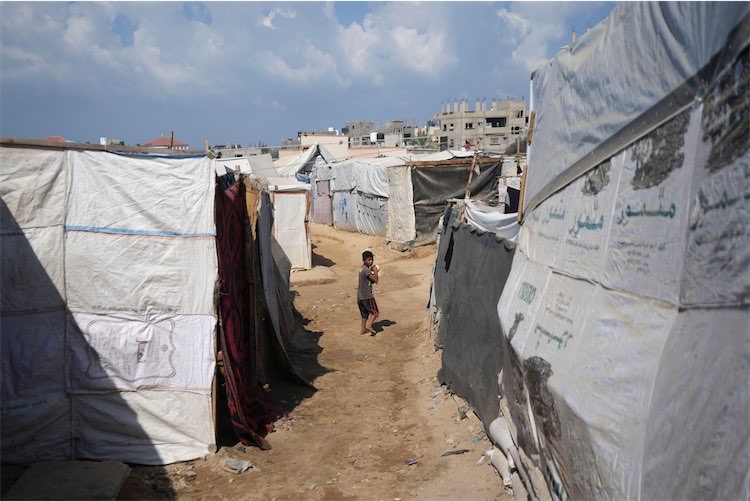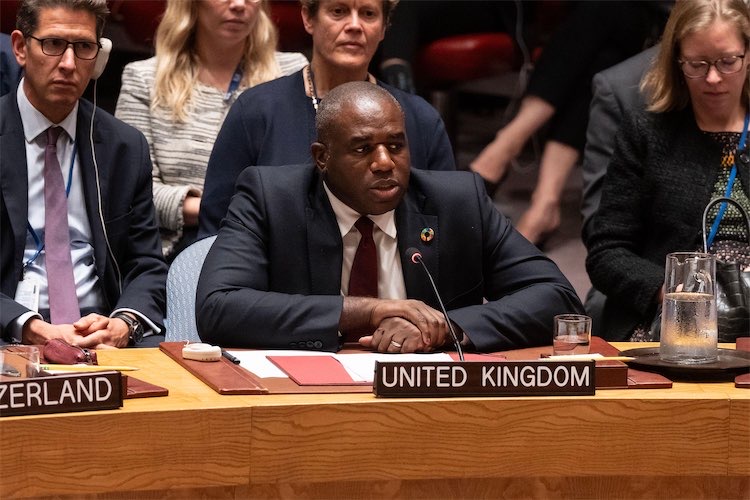Middle East Association Revived To Boost UK Understanding Of The Region
Nicholas Hopton presenting former Iranian President Hassan Rouhani his ambassador credentials in 2016 (Middle East Association)
7 min read
Exclusive: A former senior UK diplomat has resurrected the influential Middle East Association to act as a platform for “strategic, high-level” discussions between powerful politicians, ambassadors, experts, NGOs and businesses.
British diplomat Nicholas Hopton often repeats a piece of advice which was given to a new minister who entered the Foreign Office in the 1950s, following the Suez crisis: “You can ignore the Middle East – but rest assured the Middle East will not ignore you.”
Hamas leader Yahya Sinwar was killed by an Israel Defence Force patrol this week, but Israeli Prime Minister Benjamin Netanyahu responded by saying it was “not the end of the war in Gaza” until Hamas lays down arms and releases all the hostages. Meanwhile, Israeli raids into Lebanon, ongoing Houthi missile attacks in the Red Sea, and a proxy conflict between Iran and Israel continue to fuel widespread fears of a wider war across the Middle East region.
As the UK adjusts to having its first Labour government in 14 years and hundreds of new MPs in Parliament, organisations such as the Middle East Association (MEA) are emerging in an attempt to improve political understanding and dialogue with one of the most complex regions in the world.
Hopton had a long career in the Foreign Office for more than 35 years. He joined the department in 1989, going on to serve the British Embassies in Paris, Rome and Rabat, work on national security issues in the Cabinet Office, and between 2012 and 2021 act as the UK ambassador to Yemen, Qatar, Iran, and Libya.
Now, he has left his government career behind and has sat down with PoliticsHome to explain why he is giving the old organisation a new lease of life.
The MEA was originally set up in the 1960s, but has been inactive for the best part of 10 years. According to Hopton, it previously acted as a body to promote British trade and investment to the region, but about 20 years ago this became a “crowded field”, so the MEA “lost its way”. This year, Hopton was approached by the MEA’s Chief Executive Peter Meyer to reinvent and find a new role for the association.
“We’re trying to do things which other people aren't doing,” Hopton said.
“We're positioning ourselves at a fairly strategic high level, dealing with top people in government, outside government, in business, in academia, think tanks, other institutions, all of whom have one thing in common: They are focused on the UK's relationship with the Middle East and North Africa, and they want to make that relationship strong and more positive.”
The motto for the MEA will be the Arabic term “fana almumkin” – meaning “the art of the possible”. Describing the Middle East and Europe as “intrinsically tied together”, Hopton said the purpose of the MEA would be to act as a platform to facilitate, convene, and partner individuals and organisations together for educational and informative discussions. It will not, he said, act as a party or government-affiliated organisation, take political positions, or advocate for policies on behalf of lobbying groups.
Of course, Hopton still has his own views on the direction the UK needs to take, particularly in diplomatic efforts between Israel and Gaza. He told PoliticsHome: “The UK has a role to play in supporting efforts to bring about a ceasefire as soon as possible, and implementing a peace process which leads to what seems to be the only viable, sustainable, long term solution for peace and security in the region. And that is a Palestinian sovereign state.”
 Around 1.9m people – nine in 10 Gazans – have been displaced since the Hamas terrorist attack on Israel last year (Alamy)
Around 1.9m people – nine in 10 Gazans – have been displaced since the Hamas terrorist attack on Israel last year (Alamy)
However, he said that the role of the MEA would instead focus primarily on the “positive agenda” for the Middle East, including both economic trade and cultural exchange and interaction.
“What we read about and hear about on the TV is more often the terrible stuff, and that does skew our perception of the Middle East,” Hopton explained.
The MEA has already hosted one event, a reception for Arab ambassadors in London and their UK counterparts. “In many ways it was our relaunch, but we didn't bill it as such,” Hopton said.
In the next few months, more events are being hosted to establish the MEA as part of the UK foreign affairs landscape. The MEA will encourage MPs across the political divide to attend and engage with its discussions, with British-Palestinian Liberal Democrat MP Layla Moran as its sponsoring MP. In January, it will host its first parliamentary event in partnership with the Labour Middle East Council (LMEC) and the Conservative Middle East Council (CMEC), and it is also in the process of setting up a young professionals group for under-35s and a student network.
Earlier this year, PoliticsHome exclusively revealed the launch of the Labour Middle East Council, an initiative led by well-renowned Labour figures that will work towards developing and advocating for policies that "support peace, partnership and prosperity at home and abroad".
Sir William Patey, LMEC co-chair and former British Ambassador to Afghanistan, Saudi Arabia, Iraq, and Sudan, said at the time he believed “a paradigm shift in British foreign policy is imminent” as Labour was set to enter government.
Responding to the rebirth of the MEA, Director of LMEC Miran Hassan said he hoped it would be “complementary” to LMEC’s work. He added that it could be a “useful tool” for the FCDO, as well as for the “enthusiastic” new MPs elected this year who are keen to learn more about the Middle East.
 Foreign Secretary David Lammy spoke about the Middle East at the UN Security Council meeting in New York in September (Alamy)
Foreign Secretary David Lammy spoke about the Middle East at the UN Security Council meeting in New York in September (Alamy)
Charlotte Leslie, former Conservative MP for Bristol North West and Managing Director of CMEC, told PoliticsHome she felt the MEA would fill a “massive gap that has existed for a while”, explaining that CMEC had been providing a platform for businesses, experts and politicians when it would have been better organised by an institution “without a party at the start of its name”.
“That was difficult for me, because we need to keep ‘Conservative’ as part of who we are,” she said.
“I'm a great believer that whatever government that's in power, they need a body that can help that parliamentarians understand the region with nuance and balance, and that shouldn't be ‘big P’ party-political, that should be in the national interest.
“The MEA provides a good arena to bring various party-political bodies that do a very similar thing to different audiences of MPs together, and also to illustrate to an outside audience of Arab ambassadors and the rest of the world how democracy functions.”
Many of the figures involved in the MEA, LMEC, CMEC and other diplomatic organisations share the same concern – that the UK’s ‘soft power’ has been in decline in recent decades.
Leslie said the UK had “forgotten” the importance of “grown-up continuity and respectful, empathetic and humble relationship building” – and that therefore the resurrection of the MEA “could not be more timely”.
“You have ministers revolving around every 30 seconds from [other countries’] point of view, you have policy attitudes that change every 30 seconds,” she said.
“You often have politicians who wish to please a domestic audience by being very aggressive towards an external Middle Eastern country, whether legitimately or not.
“We engage with all countries, including the ones that really dislike each other. We believe in international rule of law, human rights and British national interest. We used to be known for mature, informed, fair diplomacy, and the perception from the region is we've let that go, and we urgently need to reestablish it.”
Hopton said he shared some of these concerns, adding that he thought addressing these issues would be "something that this new government will probably try and do".
“From a Middle East Association perspective, I would very much hope that we can support a more confident, engaged and impactful British foreign policy, perhaps than we've seen in recent years.”
